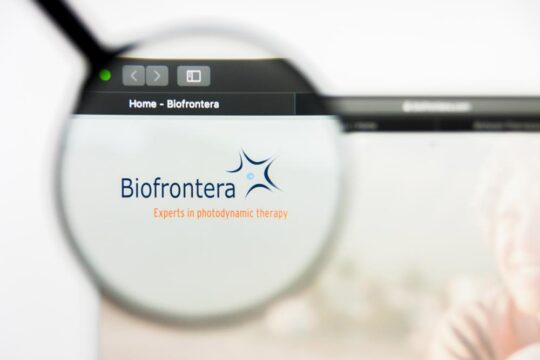Advertisment
ProMIS Neurosciences highlights innovative approaches to Alzheimer’s and Parkinson’s treatment at AD/PD 2025

ProMIS Neurosciences Inc., a clinical-stage biotechnology company focused on the generation and development of antibody therapeutics and vaccines targeting toxic misfolded proteins in neurodegenerative diseases such as Alzheimer’s disease (AD), amyotrophic lateral sclerosis (ALS) and multiple system atrophy (MSA announced plans to deliver virtual oral presentations at the 2025 Alzheimer’s and Parkison’s Disease (AD/PD) International Conference taking place in Vienna, Austria from April 1 – 4, 2025. The oral presentations are available on demand starting on Tuesday, April 1, 2025 at 7:00am C.E.T (2:00am E.T).
“We are pleased to demonstrate the potential of our computational modeling platform in the development of next-generation antibodies and targeted vaccines for neurodegenerative diseases such as AD, PD and ALS,” said Neil Warma, Chief Executive Officer of ProMIS Neurosciences. “These promising preclinical data may support vaccination with our platform-derived epitopes and selective antibody targeting of misfolded toxic aggregates of TDP-43 as a potentially safe and effective method to treat neurodegenerative diseases. We look forward to sharing these data at the upcoming AD/PD 2025 International Conference.”
Presentation details
Title: Rational Design of Alzheimer’s Vaccine to Maximize Selective Targeting of Toxic Amyloid-Beta Oligomers
Presenter: Johanne Kaplan, Chief Development Officer, ProMIS Neurosciences
Abstract Number: 1321
A large body of evidence indicates that soluble toxic oligomers of amyloid-beta (AβO) are a primary driver of AD. Through computational modeling, four different conformational B cell epitopes of AβOs were identified. A novel approach was utilized to select an optimal vaccine composition amongst 15 possible combinations of one to four epitopes to provide maximal binding to a toxic oligomer-enriched low molecular weight fraction of soluble AD brain extract.
Results from the preclinical study showed that immunization with a single conformational epitope, peptide 301, the target of the PMN310 antibody, was sufficient to produce maximal reactivity against AD brain oligomers.
Title: Novel Approach to Optimization of Alpha-Synuclein Vaccine Composition for Maximal Targeting of Toxic Alpha-Synuclein Species
Presenter: Johanne Kaplan, Chief Development Officer, ProMIS Neurosciences
Abstract Number: 1310
Vaccination against pathogenic species of alpha-synuclein (ASyn; toxic oligomers, small soluble seeding fibrils), has the potential to protect against synucleinopathies, which include Parkinson’s disease, dementia with Lewy bodies and multiple system atrophy. Vaccine constructs containing computationally-derived conformational B cell epitopes of misfolded pathogenic ASyn were tested in mice. The potential advantage of this approach, as opposed to inducing pan-ASyn reactivity, lies in preserving normal ASyn function and minimizing the diversion of active antibody by the more abundant non-toxic forms of the protein in the blood and central nervous system.
Results from the preclinical study showed that vaccination with conformational B cell epitopes produced high affinity antibodies with the desired selectivity for pathogenic ASyn and identified optimal vaccine configurations for further development.
Title: Selective Targeting of Pathogenic TDP-43 with Misfolding-Specific Monoclonal Antibodies and Intrabodies Against a Pathogenic Loss-of-Structure Epitope in the Nterminal Domain
Presenter: Neil Cashman, MD, Chief Scientific Officer and Co-founder of ProMIS Neurosciences
Abstract Number: 1426
TAR DNA-binding protein 43 (TDP-43) is associated with the pathogenesis of ALS, frontotemporal dementia, and AD. Normally, TDP-43 is predominantly localized in the nucleus, and regulates RNA splicing, transport, and stability. In disease, it is mislocalized to the cytoplasm and forms aggregates, which contribute to neurotoxicity and cell-to-cell propagation of pathogenic TDP-43. Development of effective immunotherapeutic agents requires stringent selectivity for misfolded TDP-43 in order to maintain the essential physiological functions of the normal isoform. The study’s objective was to generate and evaluate the activity of monoclonal antibodies and intrabodies against an N-terminal domain epitope only exposed when the protein is misfolded in disease.
Results of the preclinical study provided proof-of-concept evidence that supports selective targeting of misfolded toxic aggregates of TDP-43 as a potentially safe and effective avenue to treat neurodegenerative diseases associated with TDP-43 proteinopathy.
Abstracts are available on the Poster and Publications page of the Company’s website at www.promisneurosciences.com.
About PMN310
PMN310 is a humanized monoclonal antibody (mAb) designed and developed based on its selectivity for soluble amyloid-beta oligomers, which are believed to be the most toxic and pathogenic form of Aβ, relative to Aβ monomers and amyloid plaques. Soluble AβOs have been observed to be potent neurotoxins that bind to neurons, impair synaptic function and induce neurodegeneration. By selectively targeting toxic soluble AβOs, PMN310 aims to directly address the growing body of evidence indicating they may be the primary underlying cause of the neurodegenerative process in Alzheimer’s disease. PMN310 has successfully completed a Phase 1a clinical study (NCT06105528), a double-blind, placebo-controlled, single ascending dose study of the safety, tolerability and pharmacokinetics of PMN310 infusions in healthy volunteers.





